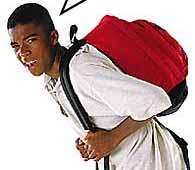

Backpacks… Your Child's Spine Is At Stake
This section is compiled by Frank M. Painter, D.C.
Send all comments or additions to: Frankp@chiro.org




I.C.P.A. Newsletter November/December 1998
By Richard A. Pistolese
We all want our children to do well in school. We make sure they bring home their books and do their homework at night. We make sure they have their books packed away in their backpacks and ready to be taken to classes the next day. However, what we may be overlooking is a threat to our children's spine more sinister than any fall off the swing set.
Recently scientists have begun to examine the effects of carrying heavy backpacks full of books. What they have discovered is that carrying heavy backpacks may pose a serious threat to your child's spinal development. A team of researchers at Auburn University has studied 421 students and found that backpacks carried with one-strap promoted lateral spinal bending and shoulder elevation. Additionally, they noted carrying a backpack promoted significant forward lean of head and trunk.
The scientists state the average backpack represented 17% of the child's body weight. If we apply this standard to adults, it would be the equivalent of the average 150 pound adult carrying a 26-pound backpack. This would explain why 67.2% of the subjects suffered muscle soreness, 50.8% suffered back pain, 24.5% suffered numbness, and 14.7% suffered shoulder pain. The researchers went on to conclude that the daily physical stresses associated with carrying a backpack on one shoulder significantly alters the posture and gait of the youth. Sanders 2 reports that Orthopedists are of the opinion that continual exposure to carrying weighted loads can promote damage accredited to the imposed postural problems caused by carrying the loads. The authors of the Auburn study also state that the effects of weight bearing induced stress is a serious issue when considering children and youths who are experiencing physical growth and motor development.
If your child does use backpacks to carry books there are things that you can do to reduce the physical stress associated with carry backpacks.It is important to remember that children and adolescent youths need backpack limitations that are sensitive to their age, weight, stage of spinal development, growth pattern and fitness level. Only by exercising prudent care can we safeguard our children's health.
Make sure that the weight of the bookbag does not exceed more than 10% of the child's total body weight. 3 This is especially important for children in grades 1-4.
Avoid using backpacks or athletic bags that have only one strap.
Ensure that children wear both straps on their shoulder's to distribute weight evenly. This will significantly reduce book bag carrying stresses.
Have your child examined regularly by a chiropractor so that any potential spinal, or postural, problems can be addressed and corrected.
References:
- Influence of carrying book bags on gait and posture of youths
Ergonomics 1997; 40(6):631-41
- Weight of schoolbags in a Freiburg elementary school. Recommendations to parents and teachers
Offentl Gesundheitswes 1979; 41(5):251-3
- Strain in children caused by carrying schoolbags
Offentl Gesundheitswes 1977; 39(7):369-78

Return to BACKPACKS


| Home Page | Visit Our Sponsors | Become a Sponsor |
Please read our DISCLAIMER |
